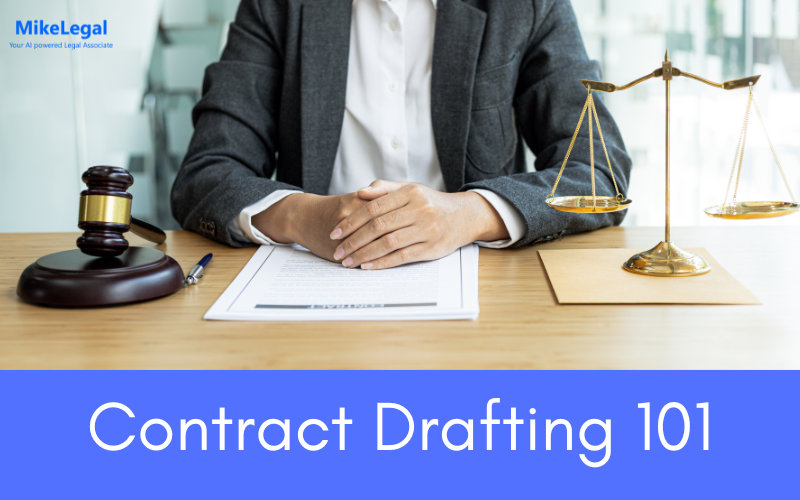Contract Drafting 101: A Simple Guide For Anyone Looking To Draft Contracts
Basics of Contract drafting:
A contract is a legally binding agreement between parties. It has details regarding the rights and duties of the parties entering into an agreement. The goal when drafting a contract is to create a document that is both legally binding to the parties, which is as per the requirement of each party, ensuring that the contract is concise and clear.
Basics of Contract:
First, every contract must have capable parties as part of the agreement — someone who is mentally capable, an adult ageing more than 18 years of his or her age and is eligible as per the laws prescribed for entering into a contract from country to country and time to time. A valid contract consists of the below-mentioned clauses:
- Offer
- Acceptance
- Consideration
- Valid purposes
All contracts must include adequate consideration to be enforceable. In employment contracts, for instance, one party agrees to complete job duties while the other agrees to pay a determined amount. Examples of consideration include Action, Money, and Property, including intellectual property. Legality should also be considered while drafting a Contract. That means whether a contract meets all jurisdictional requirements. For instance, a provision of a contract may be legal in one state and not another.
A contract is drafted with the following basic sections:
- Preamble: This section identifies the parties to the agreement, the date of the agreement, the place of formation and the addresses of the place of business of the contracting parties. If multiple affiliated parties are involved, the preamble identifies certain parties by their relationship to other parties such as corporate parents, subsidiaries, trustees and guarantors. The preamble shall list all parties intended to be bound, their legal status, place of business, intended degree of liability, change in party ownership and third-party beneficiary.
- Recitals: These set out the stage of the contract, providing the basic text, structure and context of the transaction. Recitals are typically declarative statements of facts and intentions but not generally binding provisions of the contract. In case of a purchase agreement of a product it will give a generic description with more specific information in the body of the contract.
- Definitions: Here it defines terms that appear in different parts of the agreement. This part is very important in the agreement as it gives the meaning of the term in context of the agreement. Definitions are given in the agreement so that there is no confusion in the mind of the parties related to their meaning.
- Subject Matter of Contract: This section provides for structure of the transaction broadly defining the scope and the method of payment, time of completion and the main matter of the contract.
- Consideration & Terms of Payment: This section provides for the amount to be paid, the terms of payment, any financial formulas for post closing adjustments. It also provides for break-up of purchase price. These allocations of contract price have implications on tax matters which may be different for the buyer than the seller. What benefits one party may be detrimental to the other and may have an effect on anticipated net consideration.
- Scope of Supply & Services: Essential part of any contract is description of transferred items and / or services. Based on the nature of items being transferred (product / services / real estate / business / intellectual property) a schedule is to be made.
- Indemnity and Risk Allocations: The most important part is to provide a party’s right of indemnification if the party discovers that the other party has breached one or more of its representations. In this way representations serve as a mechanism for allocating economic risks between the parties.
- Confidentiality: The contracting parties may insist on keeping all information that would be available to the other party during execution of the contract confidential.
- Effective Date, Time of Completion & Validity: The contract or agreement should have a date stated as the contract date or effective date. This date is not necessarily the date when the contract was signed but rather the date from which all the contractual rights and obligations begin and from which point any term of time, usually commences. The time allowed for completion of all work required by the Contract will be stated in this clause and will be known as the Contract Time. Validity period of a contract determines the time interval over which the terms of a contract apply. Each contract includes a basic validity period. The validity period consists of a start date and an end date.
- Termination: To reduce ambiguity it is always preferred to have a termination clause in the contract. Typical termination provisions include clauses requiring mutual agreement of the parties before termination and clauses permitting termination due to failure to fulfill closing conditions before specified date.
- Assignment: Contract rights are freely assignable in absence of an express provision to the contrary. This provision describes what constitutes an assignment and certain types of assignments. An assignment of a contract will not be enforced in the following situations:
A. The contract prohibits assignment: Contract language, typically referred to as an anti-assignment clause, can prohibit (and “void”) any assignments.
B. The assignment materially alters what’s expected under the contract: If the assignment affects the performance due under the contract, decreases the value or return anticipated, or increases the risks for the other party to the contract (the party who is not assigning contractual rights), courts are unlikely to enforce the arrangement.
C. The assignment violates the law or public policy: Some laws limit or prohibit assignments. For example, many states prohibit the assignment of future wages by an employee, and the federal government prohibits the assignment of certain claims against the government. - Miscellaneous (Boilerplate) Provisions: These are normally kept at the end of the contract and become useful in case of disputes.
- Modification and Severability of contracts: There should also be a clause written that: This Agreement may be supplemented, amended, or modified only by the mutual agreement of the parties. No supplement, amendment, or modification of this Agreement shall be binding unless it is in writing and signed by all parties. If any term or provision of this Agreement is determined to be illegal, unenforceable, or invalid in whole or in part for any reason, such illegal, unenforceable, or invalid provisions or part thereof shall be stricken from this Agreement, and such provision shall not affect the legality, enforceability, or validity of the remainder of this Agreement.
- Dispute Resolution: This clause will help the parties when a dispute arises between them. This can include the party responsible for paying attorney fees and whether the parties will use arbitration or litigation. If the parties decide to use litigation, this clause should also include the legal jurisdiction in which the breach should be resolved.
- Signatures: A valid contract must have an authorized person’s signature attested, without the signature the contract will not be in force
Once the contract is drafted following should also be done:
- Offer the contract for acceptance: After you draft a contract, you must offer it to the other party so they can consider it. The other party can accept the contract as it stands, proceeding to the final step of signing it. If they do not accept the contract, they can make a counteroffer instead.
- Negotiate the contract’s terms: If the other party makes a counteroffer to your initial contract draft, you can either accept that counter offer or provide your own counteroffer in response. These exchanges of offers may occur until both parties agree on everything. Once the negotiation part is complete every person should review the contract after each counter offer so that it is sure that you understand all changes that have been made.
- Sign the contract: Once both parties agree on the final offer, those parties must sign and date the document. The contract becomes legally binding only at that point. Both parties should obtain a copy of the contract to keep for their records.
Thus, drafting of the contract must be done with skill to prevent disputes. The terms should not be ambiguous so that in case of any dispute the matter can be resolved amicably. This is a standard draft of a commercial contract and the basic principles remain the same in all states.
This blog has been drafted by Kinnari Bhatt, during her internship with MikeLegal
References:






